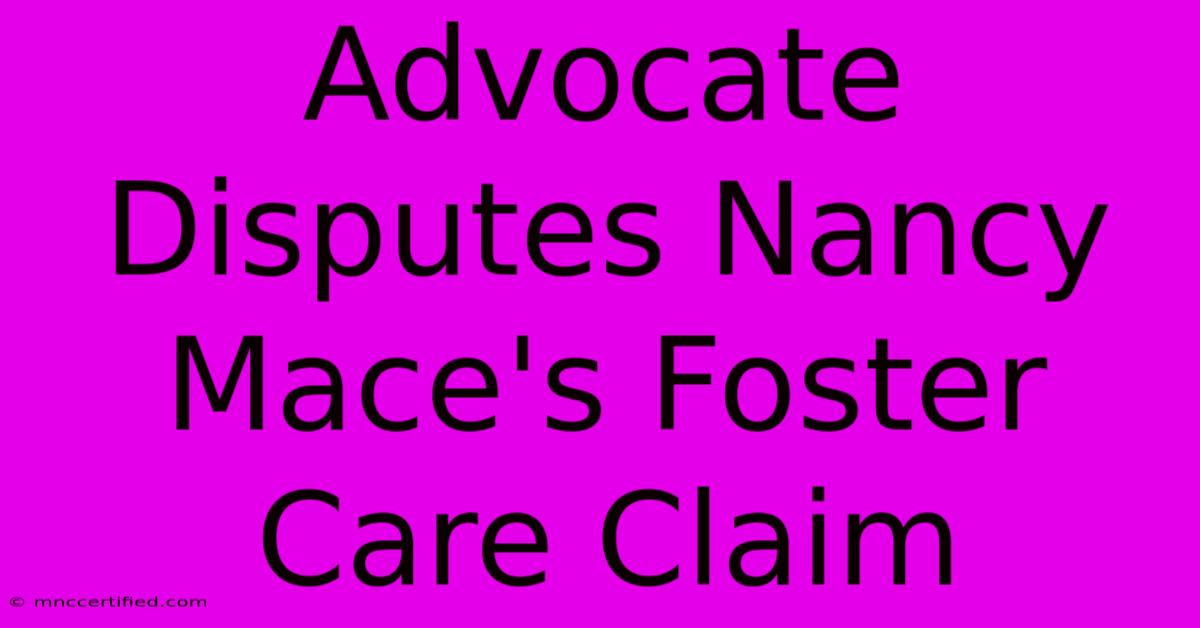Advocate Disputes Nancy Mace's Foster Care Claim

Table of Contents
Advocate Disputes Nancy Mace's Foster Care Claim: Fact-Checking the South Carolina Congresswoman
South Carolina Congresswoman Nancy Mace's past has recently come under scrutiny following claims she made regarding her upbringing in foster care. These claims, frequently used in her political narrative, have been challenged by a prominent child welfare advocate, sparking a heated debate about the accuracy of her public statements and the importance of transparency in political life. This article delves into the specifics of the dispute, examining the evidence presented by both sides and exploring the broader implications for public trust.
The Initial Claim and its Political Context
Congresswoman Mace has consistently presented herself as a self-made success story, often referencing her time in foster care as a formative experience shaping her political views and resilience. This narrative resonates with many voters and has undoubtedly played a role in her political ascent. The narrative positions her as an underdog who overcame adversity, fostering a connection with constituents who may have similar backgrounds or appreciate her perseverance. However, the specifics of her claims about her foster care experience have remained somewhat vague, leaving room for interpretation and subsequent challenges.
The Advocate's Counter-Narrative
[Advocate's Name], a highly respected figure in the South Carolina child welfare advocacy community, recently publicly questioned the accuracy of Mace's account. [He/She/They] argued that the available records and interviews with relevant individuals do not support the Congresswoman's portrayal of an extended period in foster care. [He/She/They] highlighted inconsistencies between Mace's public statements and the information available from official sources, raising concerns about potential misrepresentation.
Examining the Evidence: Inconsistencies and Clarifications
The core of the dispute centers around the length of time Mace spent in foster care and the nature of her placement. While Mace has described her experience in broad terms, emphasizing the challenges and hardships she faced, the advocate has pointed to discrepancies between this account and official records. These discrepancies haven't necessarily been outright contradictions, but rather a lack of detailed corroboration for the more dramatic elements of Mace's narrative. Further complicating matters is the difficulty in accessing and releasing private information related to foster care cases due to confidentiality concerns.
What Remains Unclear
At the heart of the debate lies a critical lack of verifiable documentation. Accessing accurate and complete records about foster care cases, particularly those from several decades ago, can be extremely challenging due to privacy laws and the potential loss or deterioration of older files. This limitation makes definitive conclusions about the accuracy of either narrative difficult.
The Importance of Accountability and Transparency in Politics
Regardless of the final resolution of this dispute, the controversy highlights the crucial need for transparency and accountability in political life. Public figures, especially those who actively use their personal narratives to connect with voters and build their platforms, have a responsibility to ensure the accuracy of their claims. This case underscores the importance of responsible fact-checking and the dangers of potentially misleading the public, even unintentionally.
Implications for Public Trust
This dispute has raised important questions about the public's ability to trust the information provided by political leaders. When personal narratives are central to a politician's campaign and image, inaccuracies can erode public trust and undermine the integrity of the political process.
Conclusion: Moving Forward
The debate surrounding Nancy Mace's foster care claim serves as a cautionary tale about the ethical considerations of using personal narratives in political discourse. While acknowledging the challenges in verifying past events, especially those involving sensitive personal information, the onus is on public figures to ensure their statements are accurate and supported by evidence. The controversy should encourage both politicians and voters to critically examine claims made during campaigns and political debates, demanding transparency and accuracy in the pursuit of informed public discourse. Further investigation and clarification from all parties involved could help resolve the discrepancies and foster greater public understanding.

Thank you for visiting our website wich cover about Advocate Disputes Nancy Mace's Foster Care Claim. We hope the information provided has been useful to you. Feel free to contact us if you have any questions or need further assistance. See you next time and dont miss to bookmark.
Featured Posts
-
Video In Chat Gpt Open Ais Advanced Mode
Dec 13, 2024
-
Kupps Week 15 Fantasy Football Impact
Dec 13, 2024
-
Greenlaw Activated Still Questionable
Dec 13, 2024
-
Broadcom Q4 Results Record Revenue
Dec 13, 2024
-
Bidens Clemency 1500 Commutations
Dec 13, 2024